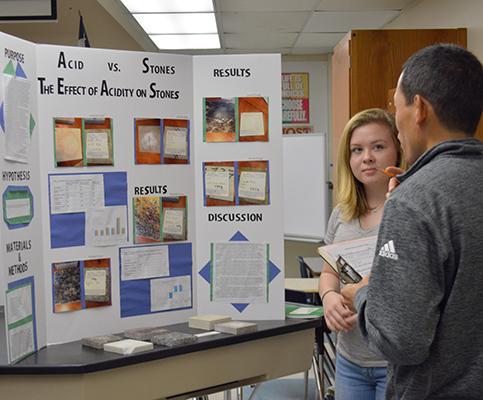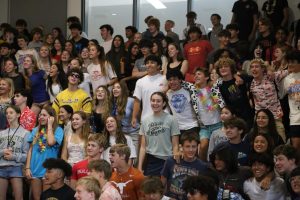Science fair rules on campus

February 11, 2017
The Science Fair took place on Jan. 12 after school in the rooms of the science teachers. Students were given time to set up their projects and present them to judges. After the fair, awards were given, and the first place winner of the fair went to freshman Connor Larkin in the computer science category for his project on “Wifi Signal Strength Through Different Building Materials and Humidity.”
Participants in the fair had been working on their projects for months beforehand gathering data for experiments or planning out a presentation.
“The work is quite a bit I know, from what my son did which was a two or three month long project,” parent Trace Hurd, said. “He was doing something biological, so you have to grow things and keep them alive and study what they’re doing.”
Participating students can find the required work tedious and challenging, especially in the preparation and delivery of their final project, which involves a short speech to a judge.
Aside from having to gather data, many students also spend time organizing poster boards and assembling models to aid them in their presentation.
“Honestly I did not have fun doing the project but I like how it turned out,” freshman Alex Paulson said.
In total there were 13 categories in the science fair including various types of studies such as Animal sciences, Microbiology and Chemistry. For many students being in the fair not only involves discovering and organizing new information, but also going beyond their regular scientific studies in class.
“I tested the effect of ocean acidification on oyster shells, specifically how the increasing amount of ocean acidification could actually decrease the mass of the oyster shells,” freshman Emily Morales said.
The final step for participants in the fair is to present their project to the judges, who take all their findings and come to a consensus on who should place where in a private meeting. To prepare themselves, students rehearse their presentations before meeting the judges, who are mostly volunteering parents of other participants.
“It’s a little bit stressful having to present in front of people that you may or may not know,” freshman Matthew Musat said. “I’ve worked pretty hard on this project and you want good results and feedback from the judges, , so I think that is the most stressful thing.”
The awards ceremony for the fair took place the next day with all participants in attendance.
Winners for the “best in show” awards were called up one by one, according to their project category. “I actually had a lot of fun with my project because I learned from it,” Morales said.








